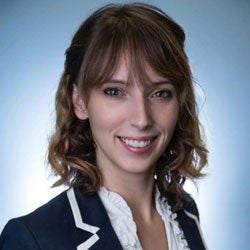Every Tuesday morning since October 2021, Pamela Sawyer, D.C. (Florida, ‘15) has packed her portable adjusting table in the trunk of her car and traveled to Orlando, Florida to provide chiropractic care to survivors of human trafficking and those recovering from substance abuse.
 Dr. Sawyer originally chose to become a Doctor of Chiropractic for one simple reason: she wanted to help people.
Dr. Sawyer originally chose to become a Doctor of Chiropractic for one simple reason: she wanted to help people.
Now as she prepares to open her new practice, Owlet Family Chiropractic, with a not-for-profit arm, Owlet Rescue, Dr. Sawyer hopes she’ll be able to help even more people through chiropractic.
“I really missed volunteering,” says Dr. Sawyer. “I grew up without a lot of money and I remember just being awed by the help we received. I felt I wanted to do that too.”
Then she met a local business owner and survivor of human trafficking who introduced her to a group of people she immediately knew needed and deserved help. She began offering free chiropractic care every Tuesday morning, which was her morning off from her job. Since then, she’s been getting more and more calls for her services as her patients tell others about how she’s been able to help them.
With a full-time job at a private practice and young children at home, it was becoming increasingly difficult to balance her time. That’s when Dr. Sawyer decided to quit her job to start her own practice that would include a not-for-profit arm through which she’ll provide complimentary care.
“I thought I would see obstacles building trust with patients I cared for in the rehabilitation house, but it’s been just the opposite,” she says. “My patients nicknamed me ‘mighty mouse’ because I’m small but mighty. I’ve adjusted 400-pound men who say ‘no, you won’t be able to help me,’ and then I do, and they can’t believe it.”
“I loved that at Palmer we were able to learn so many styles of adjustments which allows us to care for such a wide range of patients and issues. A technique may work for one patient but not the other. Knowing so many techniques make us available to so many types of patients.”
To the next generation of chiropractors who dream of caring for underserved populations, she says, “do it, it’s so needed.”
“I’ve had patients come in thinking they’re going to need surgery and they don’t. And they’ve helped me! Learning Spanish is something I’ve always wanted to do but haven’t been able to, and my wonderful patients have taught me just enough to help me communicate with my Spanish-only speaking patients. The bonds I’ve built with some of my patients is nothing short of amazing.”
 Dr. Sawyer originally chose to become a Doctor of Chiropractic for one simple reason: she wanted to help people.
Dr. Sawyer originally chose to become a Doctor of Chiropractic for one simple reason: she wanted to help people.